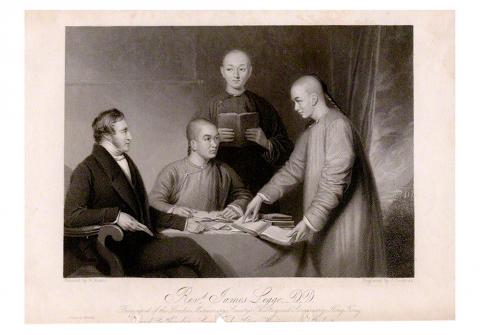Chinese practice
己所不欲,勿施於人
(ji2 suo3 bu2 yu4 wu4 shi1 yu2 ren2)

Photo: Wikimedia Commons
照片:維基共享資源
what you do not want done to yourself, do not do to others
本週所介紹的成語,其中文和英文的說法無論在用字或意義上,相似的程度幾乎就像是兩者互譯一樣。且這兩個成語的提出者,都各自在其文化領域中被尊為偉大的老師和道德思想家。
在《論語》的〈魏靈公〉篇中,子貢問孔子說:「有沒有一句話,其道理可以讓我們終身奉行呢?」孔子回答說:「是恕道」,並說明其義為「己所不欲,勿施於人」──自己不想做的事情,也不要強加給別人。
「己所不欲,勿施於人」這一模一樣的句子也出現在《論語》〈顏淵〉篇:仲弓請教孔子什麼是「仁」,孔子認為應遵循幾項原則,而「己所不欲,勿施於人」便是其中一個原則。
「己所不欲,勿施於人」所說的道理,完全就是聖經所載耶穌之言「Do unto others as you would have others do unto you」。
在路加福音第六章第三十一節中,耶穌說:「你們願意人怎樣待你們、你們也要怎樣待人。」馬太福音第七章第十二節中,耶穌也說:「所以無論何事、你們願意人怎樣待你們、你們也要怎樣待人.因為這就是律法和先知的道理。」
新約聖經原以希臘文寫成,因此不同英譯本所用的確切字句可能略有不同。現代英文版聖經的翻譯「Do unto others as you would have others do unto you」,是常用的說法。
此處所引用的《論語》英譯,是由蘇格蘭漢學家、學者及傳教士理雅各(西元一八一五~一八九七年)所翻譯。身為傳教士的理雅各在翻譯《論語》中孔子的回答時,他所熟悉的聖經內容想必也是其參照。而身為學者,理雅各一定也會知道「道德金律」或「互惠的倫理」。互惠的倫理幾乎是主要宗教和文化中都有的原則,不論是以否定的(己所不欲,勿施於人),或是肯定的(己所欲,施於人,如前引聖經之義)方式來表述。
值得注意的是,理雅各把「恕道」翻譯成「reciprocity」(互惠),而非字面意義的「forgiveness」(寬恕)。
(台北時報編譯林俐凱譯)
己所不欲,勿施於人,你不希望用骯髒的廁所,自己就要有公德心,保持乾淨。
(Do unto others as you would have done unto you. You wouldn’t want to use a dirty toilet, so have a bit of civility, keep it clean.)
他被酒駕的人撞傷後,終於明白「己所不欲,勿施於人」的道理,不再酒後開車。
(When he was hit by a drink driver he finally understood “do unto others as you would have done unto you.” He never drove under the influence again.)
英文練習
Do unto others as you would have
others do unto you
The two phrases in this week’s idiom comparison are so similar in wording and sentiment that one appears to be a translation of the other. They are both attributed to people respected as great teachers and moral thinkers in their cultural spheres.
In the Wei Ling Gong chapter of the Analects, Zi Gong asks Confucius “Is there one word which may serve as a rule of practice for all one’s life?” Confucius answers with “reciprocity” (恕, shu), elucidating with 己所不欲,勿施於人: “What you do not want done to yourself, do not do to others.”
The exact same Chinese phrase appears in the Yan Yuan chapter of the Analects, in which Zhong Gong asks Confucius about benevolence, and he answers with several principles he believes people should follow. “Not to do to others as you would not wish done to yourself” is one of these principles.
The phrase 己所不欲,勿施於人 can be used in full to communicate a similar principle to “do unto others as you would have done unto you,” a quote attributed to Jesus in the Bible.
In Luke 6:31 Jesus says, “Do unto others as you would have others do unto you.” Again, in Matthew 7:12, he is quoted as saying, “Therefore, everything you would like men to do to you, do also to them, for this sums up the Law and the Prophets.”
The Bible has been translated into English from the original Greek (in the case of the received version of the New Testament) on many occasions, so the actual wording people use can differ slightly. “Do unto others as you would have others do unto you,” from the Modern English Version (MEV), is commonly used.
The English translation of the Analects used on this page was done by the Scottish sinologist, scholar and missionary James Legge (1815 – 1897). As a missionary, he would certainly have been familiar with the Biblical reference when he translated Confucius’ answer. As a scholar, he would surely have also known of the “Golden Rule,” or “Ethic of Reciprocity.” The Ethic of Reciprocity is a principle that has appeared in almost all major religions and cultures, in either negative (do not treat others in a way you wouldn’t want to be treated, as in 己所不欲,勿施於人) and positive (treat others as you would want to be treated, as in the Bible) forms.
Note that Legge translated shu as “reciprocity,” and not its more literal translation of “forgiveness.”
(Paul Cooper, Taipei Times)
How would you like it if I treated you like that? You should “do unto others…”
(如果我也這樣對你,你會覺得怎樣?你該知道己所不欲,勿施於人。)
You can’t go wrong if you keep to the golden rule: Do unto others as you would have them do unto you.
(如果你遵守「己所不欲,勿施於人」這黃金法則,就不會出差錯。)

Despite advancements in bicycle security, millions of bicycles are stolen every year. A revolutionary bicycle lock, called “SKUNKLOCK,” takes a proactive approach to deterring thieves. __1__, SKUNKLOCK releases a noxious chemical that could cause would-be thieves to vomit and effectively discourages them from continuing their efforts to steal the bicycle. While conventional locks can be defeated by determined thieves using specialized tools, SKUNKLOCK’s dual approach of physical resistance and chemical deterrence is highly effective, making it a formidable __2__ against bike theft. The U-lock is made of high-tensile carbon steel, which can withstand attempts to break it using brute
Due to the Lunar New Year holiday, from Sunday, Jan. 26, through Sunday, Feb. 2, there will be no Bilingual Pages. The paper returns to its usual format on Monday, Feb. 3, when Bilingual Pages will also be resumed.